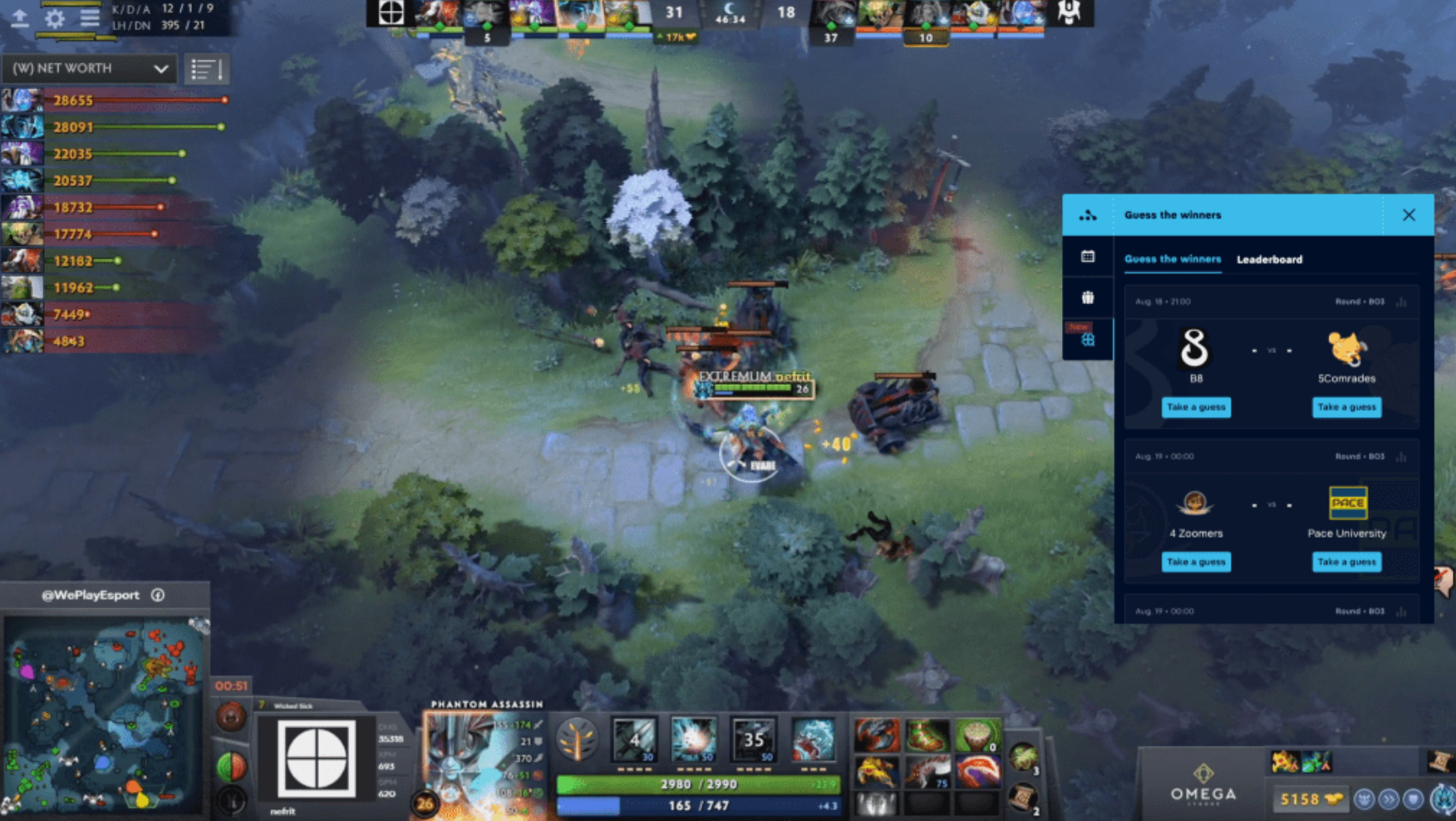Dec. 28, 2020
Esports as an experimentation platform. The WePlay! Twitch extension story

6 min read
Product Manager at WePlay Esports Rostyslav Salata talks about generating ideas and introducing a solution at Universal Sports & Games Hackathon.
Universal Sports & Games Hackathon organized by Parimatch Tech R&D center and JKR investment company took place from August 7 to 9. Gaming industry specialists showcased their projects and competed for prizes.
Product Manager at WePlay Esports Rostyslav Salata was also among the participants. He talked about how ideas and hypotheses are generated within the company and explained why the team created a Twitch extension.
Why do you consider esports as a platform for experiments?
Esports is a new industry compared to even e-commerce. There are no established rules and traditions to hosting tournaments – everything is created from scratch, at the organizers’ discretion. At the same time, industry players often borrow different approaches from other sectors. For example, a fantasy league is taken from football. Fantasy league participants create a virtual football team. Players’ prototypes take part in real competitions and win points based on the stats from their matches.
An audience is characterized not only by geography or age but also regions (CIS, North America, Asia, etc.). Games, their developers, and sponsors, in turn, define these regions.
The esports audience is technically-aware and demanding when it comes to the quality of content. One can’t easily impress video game fans with the regular standard of broadcast and on-air graphics (titles, tournament tables, or promo videos).
Things are changing rapidly in esports: new teams are being formed, their rosters ever-changing, and new players always emerging.
That’s why it’s important to react fast not only to leverage these changes but also to gain the audience’s feedback. By the way, the opportunity to gather all sorts of information is another trait of this sector. Besides historical data, we also acquire feedback in real-time.
Together these factors create a plethora of limitations and opportunities that inspire experimentation.
How are hypotheses for product development generated?
Hypotheses are generated through industry expertise and internal research.
Many endemics – the industry’s representatives – work at WePlay Esports. These are former pro-players, analysts, commentators, and even esports fans. What’s more, all employee’s opinions are taken into account at the company. Any team member can reach out to a product manager and pitch their idea. The team then brainstorms on this idea to decide whether or not to test it.
Now, about internal research. WePlay Esports is a product company with two product teams. The first is responsible for the WePlay! Tournament Platform, while the second deals with pro-events and media. Product team members create hypotheses for further testing.
How does your team search for insights and hypotheses?
Together with a designer and marketer, I search for new insights. In our quest, we use quantitative and qualitative research methods.
Regarding our quantitative approach, data analysts work with information sourced from tournaments, websites, Twitch channels, or the WePlay! Companion extension for Twitch. They also analyze data from display ads and other sources. Using this knowledge, we can not only generate hypotheses but also run A/B tests.
Our qualitative method entails collecting and analyzing user feedback from various channels.
We regularly monitor social media comments, customer support tickets, and messages from Twitch chat. We process all this information, search for patterns, and formulate hypotheses.
What tasks does the Twitch extension solve?
WePlay! Companion is a part of the WePlay Esports product ecosystem.
Its first goal is to inform viewers about a current event. Viewers can get the answers for the frequently asked questions in a chat-like “what teams are playing?”, “what’s the score?”, or “who’s playing next?” without exiting the stream.
The second important task the extension solves is user engagement during a stream. The longer a person watches a stream, the more logos or other ads they see. As a result, we fulfill our sponsorship commitments faster.
As I said earlier, WePlay! Companion is part of our product ecosystem, which makes it another broadcast touchpoint. One of the solution’s functions is guessing a match-winner. Extension users can see their forecasts with real-time broadcast graphics that appear regularly during a live show. And when we’re offline on Twitch, spectators can guess the winner on our website and see where they stand in a leaderboard.
When and how did the idea of building the extension come into play?
I remember well when Chief Product Officer Yevhen Kovalevskyi said: “Hey, we have Forge of Masters beginning in a week, and we need an extension for Twitch. Can you make it?”
The idea came from developers who were rereading the Twitch API documentation and found a section about extensions. That’s how we started developing WePlay! Companion during a five-day internal ‘hackathon’. We had the MVP version ready on the fifth day, right before Forge of Masters began. MVP (minimum viable product) is the early version of a product with just basic functionality. MVP’s are used to collect feedback, which helps improve the product afterward and provides developers with an understanding of whether its users need it at all.
Why did you decide to build your own product instead of purchasing an off-the-shelf one?
WePlay Esports follows the principle of developing as many products as possible in-house. Our R&D includes about 80 people.
Here are a few reasons why we decided to build this product ourselves:
- We can use previously gathered data and existing components of our ecosystem for other purposes.
- We can take control of the development internally, make changes, and experiment on the go.
- We can communicate directly with Twitch technical support and solve problems promptly.
We don’t operate as everyone else does, but instead, try to invent something new. If we ever took a software that other tournament operators use, then we wouldn’t be WePlay! Esports.
Is the Twitch extension a stand-alone product? At which development stage is it now?
We consider WePlay! Companion a stand-alone product of our ecosystem. The only difference from our other products is the absence of a dedicated team. Nevertheless, we’ve done nearly 20 iterations since the launch in November 2019.
For the last six months, we’ve been working on the application’s backend: stability, load optimization, etc. We meticulously collect and analyze data to learn about user needs and interests.
The volume of data we acquire is tremendous. Nearly 2 million sessions are generated during a seven-day tournament, and this is data for desktops alone.
Our team also defines product metrics to have a clear understanding of how the extension influences session duration and viewer retention during a stream.
Talking about development strategy, we’ll continue improving user retention. We’re currently building a Twitch chatbot and planning to actively work on on-air graphics (titles).
The mission of our solution is to have everything in one place. We want spectators to be interested in watching a broadcast at any of its stages, whether it’s a match, studio analytics, or a pause between matches.

